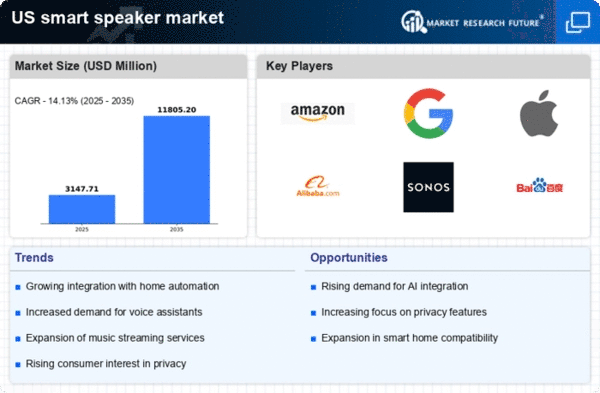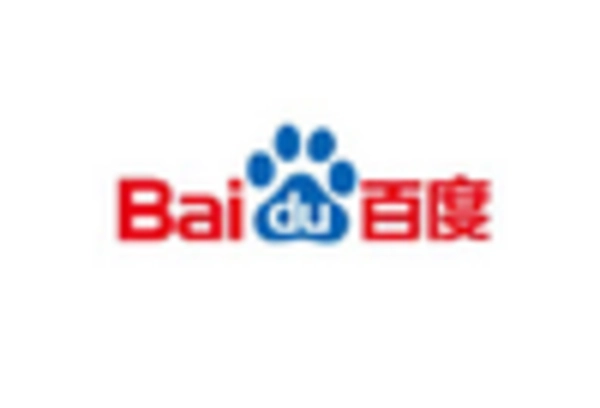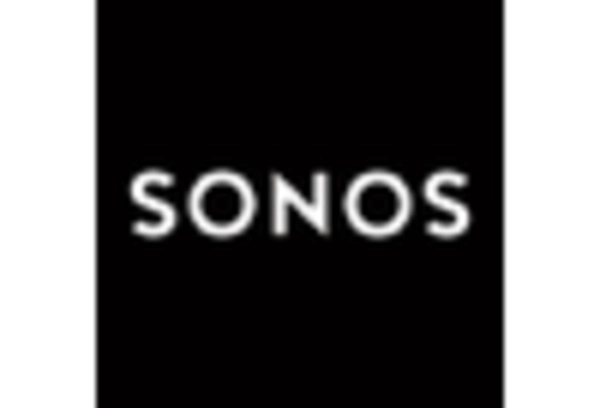Rising Consumer Adoption
The smart speaker market is experiencing a notable increase in consumer adoption, driven by the growing awareness of the convenience and functionality these devices offer. As of 2025, approximately 40% of households in the US own at least one smart speaker, reflecting a significant rise from previous years. This trend indicates a shift in consumer behavior, where individuals are increasingly integrating smart speakers into their daily routines. The appeal of hands-free operation and voice-activated features contributes to this growth. Furthermore, the proliferation of affordable models has made these devices accessible to a broader audience, thereby expanding the market. The smart speaker market is likely to continue benefiting from this trend as more consumers recognize the value of these devices in enhancing home automation and entertainment experiences.
Advancements in AI Technology
Technological advancements in artificial intelligence (AI) are playing a crucial role in shaping the smart speaker market. The integration of sophisticated AI algorithms enhances the capabilities of voice assistants, allowing for more natural interactions and improved user experiences. As of November 2025, the market is witnessing a surge in demand for smart speakers equipped with advanced AI features, such as contextual understanding and personalized responses. This evolution not only improves user satisfaction but also encourages further adoption among consumers. The smart speaker market is likely to see continued investment in AI research and development, which may lead to innovative features that could redefine user engagement and functionality in the coming years.
Increased Focus on User Experience
User experience has become a pivotal focus within the smart speaker market, as manufacturers strive to create devices that are not only functional but also enjoyable to use. This emphasis on user experience encompasses aspects such as design, ease of use, and the quality of voice recognition. As of November 2025, companies are investing heavily in user interface improvements and customer feedback mechanisms to enhance satisfaction. The smart speaker market is likely to see a shift towards more intuitive designs and personalized user experiences, which may further drive consumer loyalty and repeat purchases. This focus on user experience could also influence marketing strategies, as brands aim to differentiate themselves in a crowded marketplace.
Growing Demand for Multi-Functionality
The smart speaker market is increasingly characterized by a demand for multi-functionality, as consumers seek devices that serve multiple purposes beyond just playing music or providing information. Many smart speakers now incorporate features such as home security monitoring, smart home control, and even video capabilities. This trend is evident in the rising sales of devices that combine smart speakers with screens, which have gained traction in the market. As of 2025, it is estimated that around 30% of smart speaker sales in the US are attributed to multi-functional devices. The smart speaker market is adapting to this demand by innovating and expanding product offerings, which may lead to a more competitive landscape as manufacturers strive to meet consumer expectations.
Expansion of Content and Service Integration
The smart speaker market is witnessing an expansion in content and service integration, as partnerships between device manufacturers and content providers become more prevalent. This trend allows users to access a wider array of services, including music streaming, audiobooks, and news updates, directly through their smart speakers. As of 2025, it is estimated that over 50% of smart speaker users in the US utilize their devices for streaming services, highlighting the importance of content availability. The smart speaker market is likely to continue evolving in this direction, as companies seek to enhance the value proposition of their devices by offering seamless access to diverse content and services, thereby attracting a larger user base.















